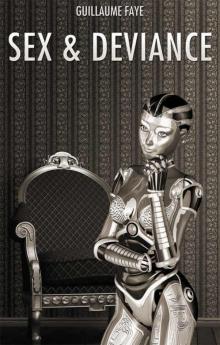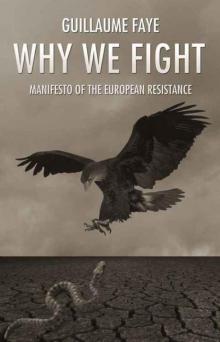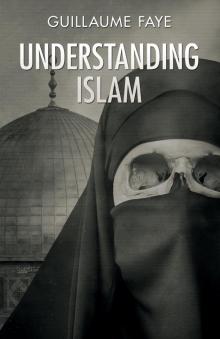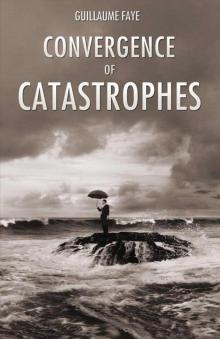Sex and deviance, p.38
Sex and Deviance, page 38




III. Christian theology and morality condemn genetic manipulations, which are, moreover, only just getting started. They reject them as anti-natural, while man is in fact integrally a part of nature. The monotheistic religions reject the notion of man as self-creator, as the Holy Father reminds us, and they thereby reject the true demiurgic nature of man, created by God. An insurmountable contradiction: God, though omniscient, made a mistake in creating man as he is. Monotheistic theologies lack internal logic. They say at once: Man is the summit of divine nature, separate from the other forms created by God, but at the same time he is liberating himself too much and contravening that nature. The biased response of Christianity is always the dogma of original sin, a not very convincing sophistry (which Jewish theology has carefully refrained from commenting upon, although the Jewish Old Testament is where it originated).
The very idea of original sin committed by Adam stands in logical contradiction with the idea of individual freedom and the responsibility of man, also affirmed by Christianity. All neo-Aristotelians have remarked upon this. Christ comes to save us from a sin we did not commit, but which an ancestor, Adam, supposedly committed. From birth, men are said to be stained with a fault inherent in their species, which was, however, created by God. This logical contradiction of original sin has poisoned the whole history of Christianity, and theologians such as Hans Küng, at odds with the Vatican, do not fail to implicitly refer to it. But they make use of intellectual contortions which would have made the disciples of Aristotle smile: ‘A thing cannot be both itself and its contrary.’
IV. The Christian definition of nature belongs to a super-nature or even an anti-nature, but it trips over the very definition of nature, and in this regard it shows itself very inferior, backwards, in comparison to the Aristotelian definition of nature (physis) as a polyvalent assemblage.
For Christian dogmatists, man is not basically free, not in regard to his own judgement, but as a function of a dogmatic law come from Heaven, falsely called lex naturae [law of nature –Tr.]. Why is blood transfusion licit for the Church (though not for certain American Protestant sects) while the therapeutic cultivation of human stem cells or of human/animal hybrid cells is illicit? Theological thought proceeds irrationally; it partakes of magical thought, even against the therapeutic interests of humanity. To touch man, who is an immutable essence, as a static and eternal living form, a creature in the image of the Creator, is impure and taboo. The self-transformation of man is considered as the supreme sin, the sin of pride, competition with the Creator. These principles are perfectly contrary to those of Greek philosophical thought.
It is probable that if Greek philosophy — which no longer believed in the gods as real entities but was imbued with the sacredness of mythology as an allegorical whole — had been able to know the theory of evolution and the possibility of genetic manipulation, it would have approved of it. All of ancient mythology, in fact, is crammed with metamorphoses of the human form provoked by the gods themselves, and Prometheus, fought by some gods, is supported by others. For in Greco-Roman paganism there is no Supreme Master but, as in life itself, combat between the gods. Only random destiny (Moira or Fatum) decides who is right, rather than a single Judge who dictates the law.
Similarly, the condemnation of therapeutic abortion or contraception, often pushed to the point of absurdity by the Church, partakes of that magical thought which interprets ‘nature’ very badly and forbids man from interfering with the sexual mechanisms provided by the Creator: hence the unrealistic injunction of the Church to stick to abstinence, rejecting contraception and abortion, in order to avoid illness or unwanted births.
V. This is because it is here, from an Aristotelian point of view, that the most serious contradiction of Christian theology appears, that which touches upon the nature of man and is divided in two parts: first, the denial of normality, and second, the paradox of animalism.
1. The denial of normality.
Life makes many mistakes and anomalies are numerous, whether for animals or for men. Aberrant and abnormal forms are frequent. This contradicts the idea of the ‘perfection’ of creation, but let us pass that over. Yet Christian morals, which have been secularised, condemn a woman’s having an abortion because she is carrying an abnormal child. This is simply because Christian morals consider that all human forms are sacred, even abnormal ones. This metaphysical position, as admirable and charitable as can be, partakes of hyper-humanism, idolatry of man, child of God. Christian women have even been seen to congratulate themselves on not having abortions, out of a sort of sacrificial happiness, and to have given birth to abnormal children — that ‘trial’ sent to them by God. This sort of morality would have been condemned as madness by Greek philosophy, which did not think of man as a divine being not subject to nature’s mistakes but as a being included in nature, that is, a cosmic being. Christian transcendent morality approves as natural normality (mos de natural rerum [custom of the nature of things -Tr.]) the birth of malformed beings, errors of biological processes, sicknesses.
Christianity thus abhors both the abortion of a fetus with a detected abnormality and abortion following rape. It considers abnormal human life as equal to normal human life. This position carries a certain moral grandeur, but is completely unrealistic. For at the same time, they reject homosexuality.... ‘No’ to homosexual marriages (limited anomaly) but ‘yes’ to the birth of persons with serious genetic infirmities (a major anomaly) with the forbidding of any abortion because of the sacred character of human life. For Aristotelian reason, such a position is unacceptable.
Also close to a denial of normality, and thus an erroneous vision of Nature, is the rejection of evolution — today abandoned under the weight of evidence, although it is still not really taken into account. If one reminds a theologian of one of the monotheistic religions that man is still evolving and that our descendants after hundreds of centuries will probably not resemble us at all, the problem is brushed aside. Man is thought of as immutable, thus in fact beyond normality.
2. The paradox of animalism.
In forbidding contraception and abortion, in severely denouncing genetic manipulation as well as certain erotic practices, the Church believes that it is aligning human sexuality and biology with the absolute naturalness of the animal, as if man were devoid of culture. Man is asked to renounce his humanity, that is, the possibilities offered by his brain to create technical and cultural synthetics, especially sexual and now genetic — risky artifacts but ones which nevertheless constitute the nature of man, ‘the most risky being of all’, as Heidegger says. Man is asked to remain on the level of ‘brute nature’. Let the Aristotelian point of view be understood: it is perfectly reasonable to condemn abortion in certain forms or under certain circumstances as it is to condemn contraception or deviant sexual practices; but to refuse them as such, as a whole, amounts to a denial of humanity and to reduce the ontological status of man to that of other animals. In Christianity and in the ideologies derived from it, these practices are not condemned for practical reasons of health but for metaphysical reasons. Prayer and the sense of the sacred are the domain of human beings, aren’t they? But eroticism is as well, along with birth control and genetic engineering.
So with the right hand Christian theology divinises man as a species made in God’s image, cut off from animalism, but with the left hand it enjoins him to renounce his capacity for self-creation and stick to animal sexuality and biology. But why did God endow man with a brain with such transgressive capacities? There is no theological response to this question, and for good reason: all theologies are founded on a non-experimental vision of the world that runs in circles, organised around pure words.
VI. Benedict XVI does not fail to emphasise that genetic manipulations are ‘dangerous’. Yes, but what is human is dangerous, that is what is proper to man. What is dangerous cannot be forbidden, only subjected to norms (the perspective of Greek philosophy) and have supervised its practical use on a case by case basis (Aristotle’s position, taken up again by English philosophy), or else it would be necessary to forbid man himself. ‘Man risks self-destruction’ says the Holy Father, by his self-emancipation. For Christian theology, man left to his own devices is dangerous and untrustworthy. This is not false, and moreover it is proper to man to place his own species in danger, and other species as well. The Pope is obviously suggesting that by obeying God, that is, the divine laws as transcribed by the Church, man will be saved from his own demiurgic essence. We fall back once again into the question of original sin. It is one of the central contradictions in Christianity (sophistically called a ‘mystery’) to affirm that man has been created by a perfect God, in his image but imperfect, and struck with a fault he did not commit (this notion seemed incomprehensible to the last pagan philosophers of the fourth and fifth centuries).
The fact that man puts himself in danger is the very essence of humanity. But then, nature puts itself in danger as well: asteroid impacts and volcanic episodes have several times wiped out the majority of living species, and life started over again with other surviving phyla. For Greek, and particularly Aristotelian philosophy, man’s shield against self-destruction and all possible cultural deviance is Reason, which determines what is just and not foolhardy according to circumstances and not from the point of view of rigid general rules.
VII. If Christian morality rightly condemns homosexuality, it does not condemn race mixture, the confounding of peoples, and it proclaims their relatedness and consubstantial resemblance — points of view which Judaism is careful not to approve. No Christian theological text has ever treated the question of the blending of peoples, while this is central in Aristotelian thought, which firmly condemns it along with migrations. For Christian morality, any man can be united to any woman. This is absolutely rejected by Aristotelian philosophy, which starts from the principle of the incompatibility of peoples, the rejection of mixture and cohabitation, and defends not the idea of the unity of human kind nor even of several human kinds, but of a diverse unity. Fundamentally individualistic, Christian morality condemns anti-nature at the individual level (opposition to homosexuality and various perversions) but not at the collective level. Conversely, the Aristotelian conception tolerates homosexuality and deviant sexual behaviour (limited to the private realm) but rejects sexual unions or cohabitation between different peoples. This difference in point of view is fundamental. Christianity recognises man in the unity of the human race. Aristotelian philosophy recognises man without the unity of the human race.
Christianity in this sense is an anthropological irrealism. Races exist among animal species, but in the human species they have no significance. Here again, man miraculously escapes the rules of living nature, of the terrestrial biosphere — hence the annoyed silence and the absence of a clear answer to the question of evolution and objective differences of performance (IQ tests, for example) between genetic population groups. Current anti-racist dogma, peculiar to the West, is directly derived (though secularised) from hasty and erroneous Christian anthropology.
So it is logical that the Church of France is in the front lines defending immigrationism, and cares nothing for the ethno-historical identity of the peoples of the European continent. The seeming argumentational cause of this position of the clergy is charity, but the real cause is obedience to the dogma of the unique parentage of man.
[1] See Aristotle’s The Categories. –Ed.
[2] A Greek philosopher from the second century, known for his opposition to Early Christianity. –Ed.
Appendix B
The Current State of the Couple, Marriage, Civil Unions and Celibacy — a Time Bomb
The profound modification in the nature of marriage since the 1970s has resulted in: 1) its quantitative diminution in favour of cohabitation or celibacy; 2) ever later age at marriage (31.7 years for men; 29.8 years for women); 3) its ephemeral character, since one marriage out of two ends in divorce within ten years, divorce having become extremely easy; 4) its loss of founding solemnity, since it often occurs after the birth of children and a common life — it is then nothing but a consecration, a pretext for a party.
Since the year 2000, the creation of civil unions has been the consequence of this social fact, and not merely the will to create homosexual marriage. The figures are rather striking, and accord with this paradox. Presently, there are three civil unions for every four marriages (249,000 marriages and 195,000 civil unions in 2010) and the figures for civil unions have exploded; but the number of marriages has hardly diminished at all since 2000 (-1 percent). In other words, civil unions have not ‘taken a bite out of marriage’; they have merely attracted couples who would have remained cohabiting without getting married. In effect, civil unions are cut-rate marriages which do not necessitate an expensive ceremony, which can be dissolved even more easily than marriage, and which provide almost as many advantages as the latter. A new expression has entered the language: ‘to get civil-unioned’ [se pacser]. Civil unions are altogether in conformity with this society of the ephemeral, the present, the rejection of lineage and of the future. It is a sub-marriage with a minimum of responsibility and commitment. But criticising it on the grounds that it will destroy marriage is not pertinent, for in reality it is nothing but putting ‘cohabitation’ in a legal form.
In a certain minority of cases, the civil union is a prelude to marriage and replaces engagement, which is dying out. All these phenomena contribute to a sort of ‘watering-down’ of marriage (for the benefit of virtual Facebook ‘friendships’ with people one never meets?), which is not a good omen.
* * *
Another little-known statistic provided by the National Institute of Demographic Studies (NIDS) is much more interesting than those relating to civil unions, and shows that the proportion of male and female single people, neither cohabiting, nor married, nor in a civil union, continues to grow. Thirty-five percent of those born in the 1970s are single, both sexes included. This is an enormous figure, and it is the central disturbing phenomenon, much more important than homosexual marriage. The number of adults living as couples is continually decreasing, especially in the case of those aged between 25 sand 65 years old, ‘because of the rising number of separations’, according to the NIDS. This is a major social upheaval such as no society has ever known (only pariahs and the unfortunate used to be single and isolated), and which expresses an exacerbation of individualism, of peaceful social solipsism. Thus, a market for single people has appeared. In supermarkets, prepared ‘one person’ meals are taking over the shelves. The sex industry via the Internet is aimed principally at the increasing masses of bachelors; its task would be much more difficult with married men.
It is the least credentialed who live as bachelors after 30, for ‘men with diplomas favour living as part of a couple’ according to NIDS. Among underqualified women between 30 and 45, the rate of singlehood has reached 35 percent, whereas for previous generations it was negligible. Even more serious is the increasing number of abandoned women raising their children alone.
The principal point of concern here is much less the decline of traditional marriage or the rise of civil unions and gay marriage than the decline of the couple in favour of single life, which is an entirely anti-natural social tendency, and very dangerous in the long run. A society in which the mass of isolated single persons of both sexes (bound only by the virtual farce of Internet social networks of ‘false friends’) passes a certain critical level risks a universal breakdown of solidarity. For solidarity does not merely rest on the anonymous contributions of the Nanny State or social networks, but on communal and familial bonds whose basis is the united couple.
Of course, many single persons, especially in the well-to-do classes, live by themselves without difficulties. They have their networks of friends as well as their (ephemeral) lovers and mistresses of a weekend. Yes, but when they get old, what will become of them? Happy singles in youth with the strength of their age, they will be unhappy in the retirement home without family, without children, without friends (they will be either just as old or dead), surrounded by nurse-practitioners.
Our present-centred and individualistic society (yet no more egoistic than any other) does not think about the future, but about the here and now. The calculation is simple to make, and we must reason pragmatically and not romantically: the best social security when one gets old is the family and not the State. But material and medical social security are not all; do not forget the emotional security, as important as anything pertaining to the body. Think of the old rich man languishing, wasting away, just waiting for death without visits from his family, isolated among the indifferent ‘care personnel’ of the retirement home.
All this to say that generations with ever-rising proportions of single people will have very unhappy lives once they pass a certain age due to isolation. They will be the familyless, solitary, and woebegone. This situation will have been caused by the withdrawal of the stable and fertile couple. For the stable and fertile couple (which manages adulterous sex with necessary hypocrisy) is the foundation of the family, which is itself the basis of psychological stability and mutual aid. Without family and without a stable succession of generations, without any children attached to him, the egoistic young bachelor of today will be tomorrow’s solitary, sick, and despairing old man.



















